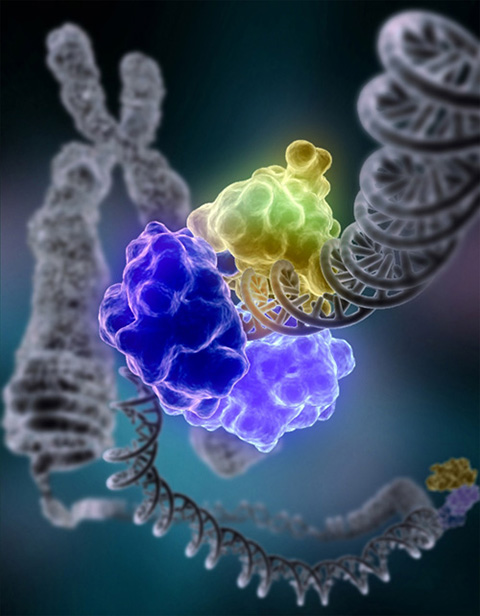Scientists identify pan-cancer biomarkers
Genomics and transcriptomics have successfully identified many therapeutic targets for cancer. However, changes in protein abundances and their chemical modifications can also drive tumor progression. To consider this additional dimension, Guo-sheng Hu, Zao-zao Zheng, Yao-hui He, Du-chuang Wang and colleagues at Xiamen University analyzed RNA and protein data from thousands of patients with 13 cancer types. They published their findings in Molecular & Cellular Proteomics. Using bioinformatics tools, they identified upregulated and downregulated genes specific to each cancer type as well as genes common to most types analyzed.

The team discovered that tissue-specific genes were downregulated at both RNA and protein levels in all cancer types, indicating a loss of tissue identity. They showed that many genes involved in messenger RNA splicing, interferon pathway, fatty acid metabolism, and complement coagulation cascade, were dysregulated across several cancer types. The authors also found that ADH1B, the alcohol dehydrogenase that converts ethanol to acetaldehyde, was significantly downregulated in all cancer types. Conversely, the ribonucleotide regulatory subunit RRM2 was overexpressed. These proteins are examples of potential pan-cancer biomarkers, which can be used to discern cancer tissues from normal cells and potentially inform novel therapeutic strategies.
Effective cancer treatment also requires knowledge of the tumor’s stage of progression. To identify biomarkers for each tumor stage, the team analyzed how the cancer proteome changed throughout tumor progression. They used these findings to build models for tumor stage classification of several cancer types based on these biomarkers. They further constructed prognostic risk stratification models for corresponding cancer types based on dysregulated genes. They found that these models, when combined with the tumor-node-metastasis classification system, predicted cancer patient prognosis more accurately than either approach individually.
Protein-based approaches like these could be the key to better understanding cancer mechanisms and developing better treatments. Inhibitor drugs targeting RRM2 and other differentially expressed proteins identified in this study could be used to treat a range of cancer types and will be investigated further in future studies.
Enjoy reading ASBMB Today?
Become a member to receive the print edition four times a year and the digital edition monthly.
Learn moreGet the latest from ASBMB Today
Enter your email address, and we’ll send you a weekly email with recent articles, interviews and more.
Latest in Science
Science highlights or most popular articles

Chemistry meets biology to thwart parasites
Margaret Phillips will receive the Alice and C. C. Wang Award in Molecular Parasitology at the ASBMB Annual Meeting, March 7-10 in Washington, D.C.

ASBMB announces 2026 JBC/Tabor awardees
The seven awardees are first authors of outstanding papers published in 2025 in the Journal of Biological Chemistry.

Missing lipid shrinks heart and lowers exercise capacity
Researchers uncovered the essential role of PLAAT1 in maintaining heart cardiolipin, mitochondrial function and energy metabolism, linking this enzyme to exercise capacity and potential cardiovascular disease pathways.

Decoding how bacteria flip host’s molecular switches
Kim Orth will receive the Earl and Thressa Stadtman Distinguished Scientists Award at the ASBMB Annual Meeting, March 7–10, just outside of Washington, D.C.

Defining JNKs: Targets for drug discovery
Roger Davis will receive the Bert and Natalie Vallee Award in Biomedical Science at the ASBMB Annual Meeting, March 7–10, just outside of Washington, D.C.

Building better tools to decipher the lipidome
Chemical engineer–turned–biophysicist Matthew Mitsche uses curiosity, coding and creativity to tackle lipid biology, uncovering PNPLA3’s role in fatty liver disease and advancing mass spectrometry tools for studying complex lipid systems.

